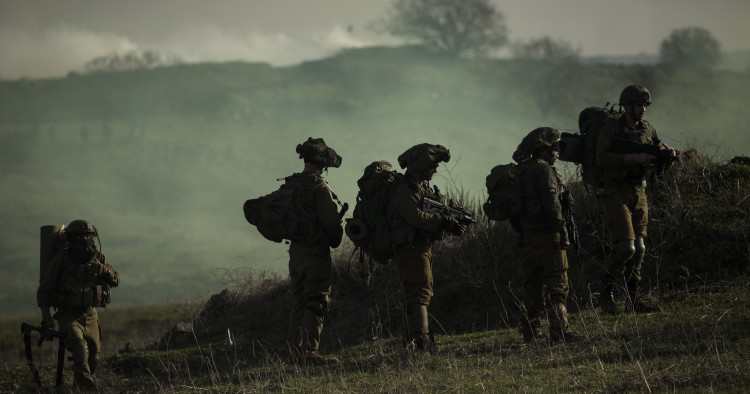If both Israel and Hezbollah stand to lose from escalation, then why does it feel like war between them is imminent?
Intentions matter, and both parties have warned about the risks and consequences of a full-fledged return to arms. But in this case, their actual intentions are neither clear — at least on the Israeli side — nor sufficient.
Soon after Hamas’ Oct. 7 attack, Israeli Defense Minister Yoav Gallant advocated for a preemptive Israeli strike against Hezbollah. US President Joe Biden and his closest national security aides cautioned the Israelis against such a move, but it is hard to tell how widespread that Israeli impulse was, and possibly still is, especially inside the Israeli military. I do not think it completely dissipated. Israeli officials openly remind their American counterparts that Israel will continue to do what is in its best interest and that it maintains freedom of action. As always, there are limits to US diplomatic pressure, and Secretary of State Antony Blinken openly admitted as much in his latest visit to Israel.
We also must not forget that the current Israeli government is the most right-wing in Israel’s history. This has implications for issues of war and peace. To ensure his political survival, which he will pursue even at the expense of Israel’s national interest, Israeli Prime Minister Benjamin Netanyahu must be sensitive to the wishes of coalition partners Bezalel Smotrich, the head of the Religious Zionism list, and Itamar Ben-Gvir, the leader of Jewish Power. Smotrich and Ben-Gvir speak for the most extremist elements of Israeli society — those who do not believe in compromise or negotiations and instead want sovereignty over all Palestinian territory. We do not know their intentions vis-à-vis a confrontation with Hezbollah, but I assume they are neither calculated nor reassuring.
Not only does Netanyahu have to manage this radical coalition but he also must deal with the political and financial pressure that is generated by thousands of Israelis living in the north who had to evacuate due to Israel and Hezbollah’s exchange of blows.
Netanyahu, along with the Israeli military, needs a concrete victory against external foes to appease an angry and worried Israeli public. If he cannot achieve it with Hamas, he might try with Hezbollah. It sounds ludicrous and reckless given that Hezbollah is far more powerful than Hamas — a new war with the group could lead to triple if not quadruple the number of Israeli and Lebanese casualties from the 2006 conflict, which was roughly 1,200 Lebanese and 165 Israeli deaths — but Netanyahu’s politics might override strategic logic.
Israel says that it has transitioned to a lower-intensity “third phase” in its operations against Hamas, but that does not mean that more surgical attacks against Hamas, and lately Hezbollah, are viewed as less escalatory by either organization. It could well be the opposite. After all, Hamas and Hezbollah value the lives of their own leaders and operatives more than those of average Palestinians and Lebanese. Killing a Hamas or a Hezbollah military commander, which Israel already has done in Gaza, in Beirut, and in southern Lebanon, is perceived by both groups as deadlier and more provocative than, for example, a strike against a military facility or a civilian target.
If Israel does not want another war with Hezbollah, it certainly is not showing much restraint with its latest attacks. Israel believes that going after Hezbollah personnel is fair game: The latest deadly strike was against Wissam Tawil, reported to be a commander of the group’s elite Radwan forces. But Hezbollah simply will not absorb the hits without hitting back. In fact, it already has, including against sensitive Israeli military installations to show its long-range and precision capabilities.
Hezbollah has repeatedly communicated that it does not seek a large-scale war with Israel; but if Israel continues with its decapitation campaign, or if it dramatically intensifies its bombing of the group’s military assets, Hezbollah will most likely lash out. Then, all bets are off. Iran may not want to risk one of its key strategic deterrents, Hezbollah, in a fist fight with Israel. But if Hezbollah’s own wellbeing, coherence, and effectiveness come under significant question, then there will be no strategic deterrent for Iran to speak of.
That neither Israel nor Hezbollah wishes to escalate is relevant, but that situation is hardly stable or sufficient to prevent the worst from happening. We have seen this movie before: In 2006, it led to 34 days of intense fighting and much death and destruction. The present conflict is ripe for miscalculation because tensions in the entire region are high. Only a ceasefire, both in Gaza and along the Israeli-Lebanese border, will pull the antagonists back from the brink of all-out war. This should be Washington’s top and most urgent priority.
Bilal Y. Saab is a senior fellow and director of the Defense and Security Program at MEI.
Photo by Amir Levy/Getty Images
The Middle East Institute (MEI) is an independent, non-partisan, non-for-profit, educational organization. It does not engage in advocacy and its scholars’ opinions are their own. MEI welcomes financial donations, but retains sole editorial control over its work and its publications reflect only the authors’ views. For a listing of MEI donors, please click here.













